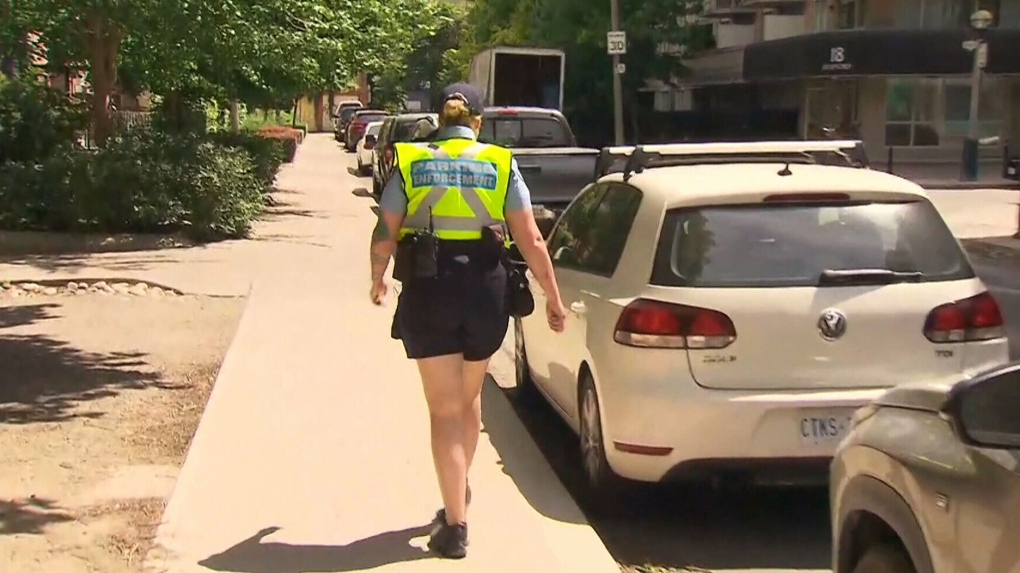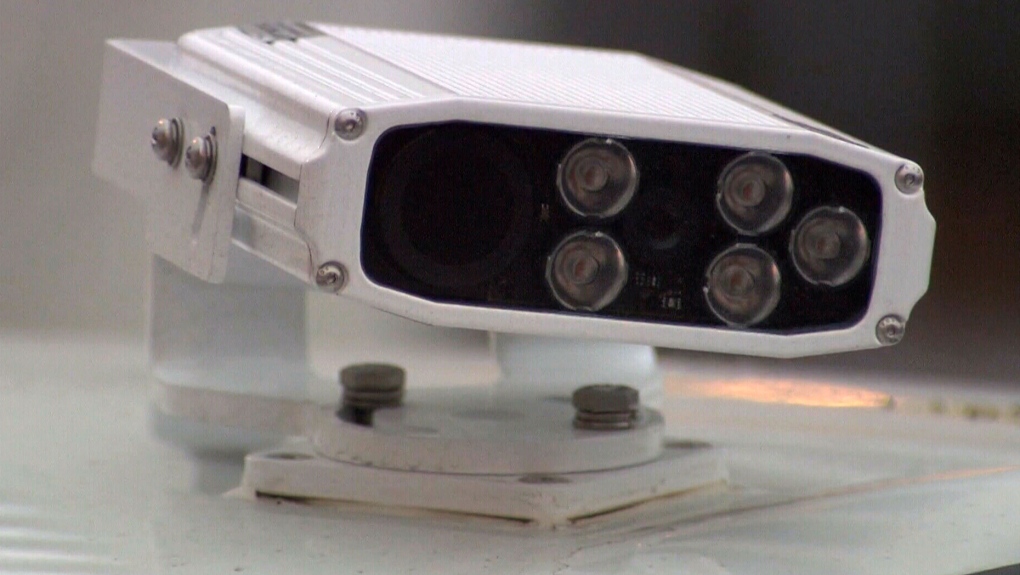Toronto Police pitch licence plate scanners as a way to close parking ticket 'loophole'
The Toronto Police Service are eyeing ways to add more technology to the city’s parking system in a way that could make it harder for drivers to avoid tickets — and close what one self-styled parking vigilante calls a “loophole.”
Rennie Johnson walks the streets of his St. Clair Village neighbourhood to blow the whistle on illegal parkers and says over the hundreds of cars he’s called in, he’s noticed a pattern when he complains to parking enforcement.
“There’s a loophole. You have to call at a certain time,” he told CTV News while checking out whether the cars that are parked on his street have passes — or are overstaying their welcome, something he’s seen more often in the pandemic.
Johnson gets results — parking officials often respond to his complaints, as evidenced by one blue van that had a $30 ticket when CTV News visited.
But he has noticed that if he calls after about 10am, it’s much less likely that someone will get a ticket for staying longer than the maximum three hours.
“It bothers a lot of people who have to go up another block and walk home after a long day,” Johnson said.
 A parking enforcement officer is captured in a CTV News Toronto report on June 24, 2022.TPS officials admitted that there is an enforcement gap of sorts: a limitation because of the manual way that their officers track parked cars.
A parking enforcement officer is captured in a CTV News Toronto report on June 24, 2022.TPS officials admitted that there is an enforcement gap of sorts: a limitation because of the manual way that their officers track parked cars.
They chalk a tire by hand to prove someone hasn’t moved their car. The same officer has to chalk it and check it after three hours. And if an officer changes shifts, it’s back to square one.
Officers say they’re looking at technology that other cities have that could bridge the gap, including licence plate scanners. The scanners take pictures of a licence plate, and scan it into a database — information that any officer could access to write a ticket.
That would close the so-called loophole — but there aren’t any timelines yet. It’s part of a larger examination of new technology that Supt. Scott Baptist says could be as transformative as the adoption of the GreenP app to pay for parking.
He pointed to the options that a large-scale digital mapping of Toronto streets could produce: drivers paying for the opportunity to park in non-metered areas and avoiding tickets, while digitally tracking it in such a way that residents would be much less likely to be affected — though warned there are no hard decisions made yet.
“It’s a conceptual discussion we’re having as we’re trying to improve the system for people trying to come into the City of Toronto,” he said in an interview.
 A licence plate scanners takes a pictures of a licence plate and scans it into a database.Until then, some drivers appeared to be taking advantage of Johnson's street. One man in that blue van returned to find his ticket — and explained he was another resident who had let his friend park in a driveway, and he parked on the street.
A licence plate scanners takes a pictures of a licence plate and scans it into a database.Until then, some drivers appeared to be taking advantage of Johnson's street. One man in that blue van returned to find his ticket — and explained he was another resident who had let his friend park in a driveway, and he parked on the street.
“I parked it over here and I forgot it overnight,” he said.
Another woman told CTV News she works nearby for minimum wage, and just can’t afford to pay for parking.
“I move my car every so often,” she said.
One caveat on the new technology: when paying for parking, or parking tickets, becomes easier, revenues tend to rise. That’s what happened in other cities adopting licence plate scanners, and what happened when Toronto adopted the GreenP app.
Supt. Baptist said for him — it’s not about the money.
“This is a huge project. To take this on, it’s going to be a significant investment. It’s going to have an impact broadly on how parking is structured within the City of Toronto,” he said.
CTVNews.ca Top Stories

Quebec nurse had to clean up after husband's death in Montreal hospital
On a night she should have been mourning, a nurse from Quebec's Laurentians region says she was forced to clean up her husband after he died at a hospital in Montreal.
Northern Ont. lawyer who abandoned clients in child protection cases disbarred
A North Bay, Ont., lawyer who abandoned 15 clients – many of them child protection cases – has lost his licence to practise law.
Bank of Canada officials split on when to start cutting interest rates
Members of the Bank of Canada's governing council were split on how long the central bank should wait before it starts cutting interest rates when they met earlier this month.
Maple Leafs fall to Bruins in Game 3, trail series 2-1
Brad Marchand scored twice, including the winner in the third period, and added an assist as the Boston Bruins downed the Toronto Maple Leafs 4-2 to take a 2-1 lead in their first-round playoff series Wednesday
Cuban government apologizes to Montreal-area family after delivering wrong body
Cuba's foreign affairs minister has apologized to a Montreal-area family after they were sent the wrong body following the death of a loved one.
'It was instant karma': Viral video captures failed theft attempt in Nanaimo, B.C.
Mounties in Nanaimo, B.C., say two late-night revellers are lucky their allegedly drunken antics weren't reported to police after security cameras captured the men trying to steal a heavy sign from a downtown business.
What is changing about Canada's capital gains tax and how does it impact me?
The federal government's proposed change to capital gains taxation is expected to increase taxes on investments and mainly affect wealthy Canadians and businesses. Here's what you need to know about the move.
New Indigenous loan guarantee program a 'really big deal,' Freeland says at Toronto conference
Canada's Deputy Prime Minister Chrystia Freeland was among the 1,700 delegates attending the two-day First Nations Major Projects Coalition (FNMPC) conference that concluded Tuesday in Toronto.
'Life was not fair to him': Daughter of N.B. man exonerated of murder remembers him as a kind soul
The daughter of a New Brunswick man recently exonerated from murder, is remembering her father as somebody who, despite a wrongful conviction, never became bitter or angry.
































